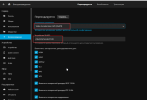Hello community,
id like to install amdgpu / amdgpu-pro drivers on proxmox to pass my gpu to lxc containers.
did anyone get that to work on proxmox 7?
can anyone help me out with steps to get drivers to work on proxmox?
with kindregards
PS: do i also have to install the drivers in the lxc container or can i skip that? (provided it is possible to get amdgpu onto proxmox7)
id like to install amdgpu / amdgpu-pro drivers on proxmox to pass my gpu to lxc containers.
did anyone get that to work on proxmox 7?
can anyone help me out with steps to get drivers to work on proxmox?
with kindregards
PS: do i also have to install the drivers in the lxc container or can i skip that? (provided it is possible to get amdgpu onto proxmox7)



